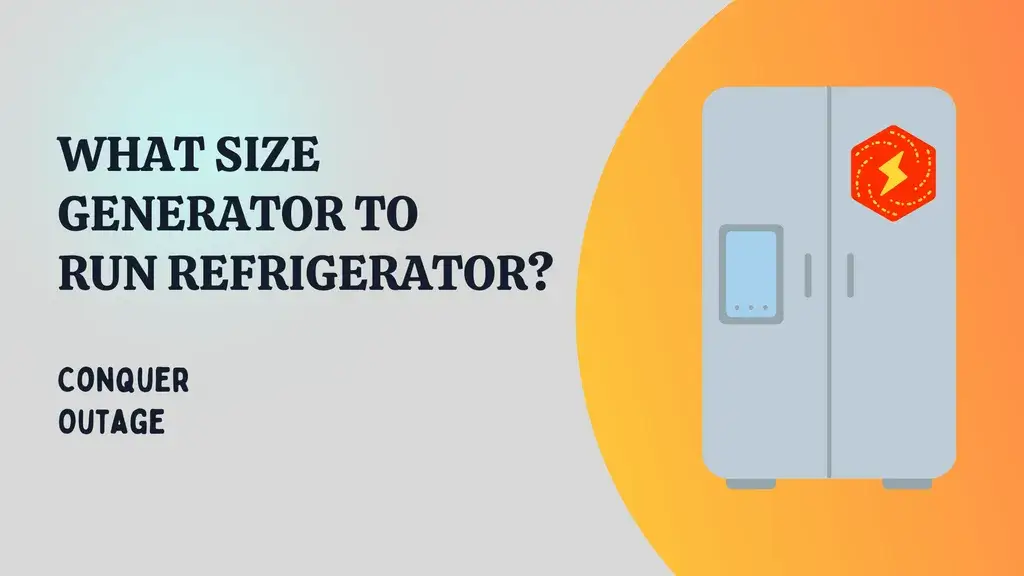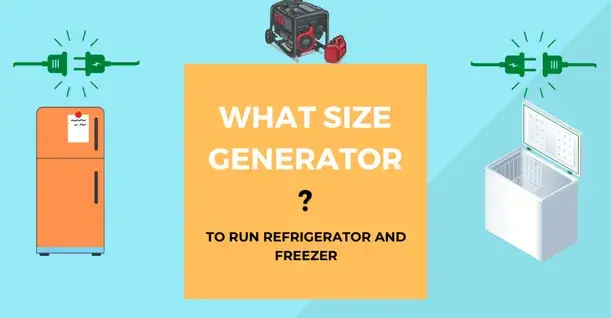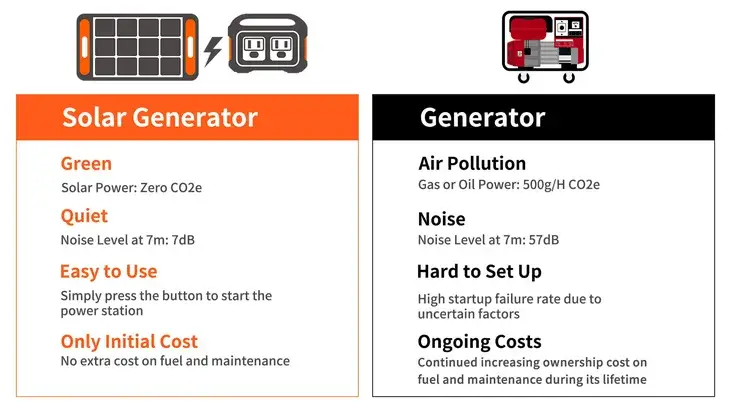Storing our foods at a cold temperature protects them from attracting bacteria and fungi. Therefore, every time there’s a power outage, if the refrigerator stops running for a long time because of no electricity, food items like frozen snacks, raw meat, and dairy products in our fridge may start to rot and decay.
In such cases, you can’t stress the importance of a generator enough. But many people get confused when choosing a generator because of not knowing what size generator runs a refrigerator or a freezer if you have one.
Now, if you want to find out what size generator to run the refrigerator and freezer of your house, in that case, several factors need consideration, such as the size and volume of your fridge-freezer and the number of watts these appliances consume, etc.
Without further ado, let’s jump into the details.
Table Of Contents

What size Generator to run Refrigerator and Freezer?

To determine the generator size you require for running your refrigerator; you need to ask yourself these two questions first:
#1. Are you using a recent model or an old refrigerator model?
Modern refrigerators are designed to be energy-efficient and environment-friendly. They consume less power yet do not compromise on performance. A typical-sized refrigerator for an average household will likely use around 300 to 400 watts of electricity.
On the other hand, older refrigerator models will consume twice this amount of energy, ranging from 600 to 800 watts.
#2. Does your refrigerator also come with a freezer?
If you’re planning to run your refrigerator and freezer on the same generator simultaneously, add an extra 100 watts to the above figures. So basically, buying a 2000-watt generator to run refrigerator and freezer together will be sufficient.
Last but not least, don’t forget the starting watts needed to kickstart your refrigerator’s compressor with an electric jolt for about 2-3 seconds.
Let’s say if your refrigerator and freezer consume a total of 700-800 watts of power, you’ll need a generator that can provide twice or thrice this amount of energy in watts for a one-time kickstart, for example, at least 1400-1600 watts.
What size Solar Generator to run Refrigerator and Freezer?

There’s no straightforward answer to this question but let’s figure it out together. We must consider the following factors when determining the solar generator size needed to run a refrigerator and freezer :
#1. Wattage Consumption
Take help from the operator’s manual to determine how much power your appliances consume. You can also check whether there’s a yellow sticker on the refrigerator door labeling the power usage. Or look it up on the manufacturer’s website by the refrigerator model number.
If your refrigerator and freezer need 600 watts to run together, you need a solar generator that can supply at least 700-800 watts of power because you will want to power up some lights and fans too during a power outage or load shedding. Generally, a 300-watt solar generator is enough to power a mini-fridge or an RV refrigerator.
To run a full-sized large refrigerator with a freezer simultaneously, you should go for a solar generator with high solar input. Also, considering the kickstart requirement, we’ll recommend at least twice the size required. We believe you should go for a solar generator that can supply between 1600-2000 watts.
#2 Generator Storage Capacity
Suppose you’re living in a country with short day and long night hours with less than 4 to 5 hours of intense sunlight available. In that case, you should go for a solar generator with a high solar power storage capacity so that your generator can efficiently run the appliances at night without the sun.
Always ensure enough solar panels and batteries for a solar generator to run a refrigerator efficiently for more than 24 hours.
#3 Size of Refrigerator
What size solar generator you’ll need also depends on the size of your refrigerator, amongst other factors. If you have an average-sized refrigerator measuring 16 cubic feet, your appliance will likely consume 1500Wh of energy daily. You’ll need a solar generator supplying at least 400-500 watts for 24 hours.
On the other hand, a large refrigerator measuring between 20-22 cubic feet or more will consume at least 2000Wh of energy per day. If you have a big household and want to run a full-sized refrigerator on a solar generator, it should be able to supply more than 600 watts of solar energy to the least.
What size Generator do I need to run a Chest Freezer?
A small chest freezer measuring about 5-6 cubic feet will need between 700-850 watts of power to start and an additional 100 watts to run. On the other hand, a medium-sized chest freezer measuring 12-13 cubic ft. is likely to consume a minimum of 300 watts a day, whereas a large 20-22 cubic foot freezer will need 350-400 watts of energy to run. If you’re using an older model, double the numbers above to get an average estimate.
All in all, for a small chest freezer, buy a 1000-watt generator. Buy a 1500-watt generator for running a medium-sized chest freezer with 350L capacity or a 2000-watt generator to power up a larger chest freezer with 450-500L storage. You’ll be on the safe side with nothing to worry about.
What size Generator do I need to run 2 Refrigerators?
Again, as we mentioned earlier, the first step is to calculate the refrigerators’ total wattage consumption and add them together. Let’s say the two refrigerators are of the same size and volume; if one consumes 700 watts, the total would be 700 × 2 = 1400 watts.
Now, if these refrigerators also have a freezer section each, the total wattage consumption could be around 2000-2500 watts. If refrigerators have a dispenser or ice-maker compartment, know that these features will charge more electricity.
Suppose you want to run some other household appliances along with your two refrigerators, such as the microwave oven, television, rice cooker, or coffee maker. In that case, you should go for a 3500-watt generator.
Final Thoughts
We realized that many people are confused about what size generator to run a refrigerator and freezer. Well, we decided to calculate the numbers and come up with this article for you. Always remember the generator size you need to buy will depend on several key things – the size and model of your refrigerator. The total power consumption, starting wattage of the fridge, and the type of generator you’re willing to buy – whether solar, gas-fueled, or battery-powered.
